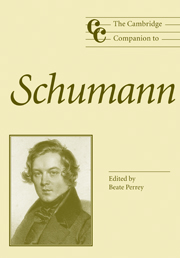12 - The compositional reception of Schumann's music since 1950
from Part III - Reception
Published online by Cambridge University Press: 28 September 2011
Summary
Schumann: a model case
As a composer, Robert Schumann was particularly conscious both of the necessity and of the difficulties of a creative engagement with the music of earlier times. This explains his famous saying that history, because of the examples it holds up to the present, is an ‘Angel of Death’. While he occasionally seems to have been driven almost to despair by his predecessors, he nevertheless also trained himself by an intensive study of their works. The exemplary intellectual alertness that this demonstrates is something of which later composers who find themselves responding to his music should be aware.
This chapter will focus on concepts that aim to illuminate one particular aspect of the past and bring out its most fascinating features, or the specific questions it raises. Following a few general remarks, we shall look at a series of paradigmatic works that, insofar as they are marked by an engagement with Schumann, show in an exemplary way how he was seen as so inspiring by other composers even in the second half of the twentieth century. This influence was particularly due to his compositions, but it also stemmed from his life and thought. Schumann's own Bach reception anticipates key aspects of the examples I have selected: for more recent composers, Schumann functions as a catalyst, as well as helping them to become more self-aware and more sure of their own creative powers.
- Type
- Chapter
- Information
- The Cambridge Companion to Schumann , pp. 252 - 267Publisher: Cambridge University PressPrint publication year: 2007



